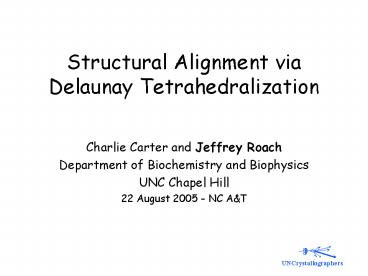Structural Alignment via Delaunay Tetrahedralization - PowerPoint PPT Presentation
1 / 27
Title:
Structural Alignment via Delaunay Tetrahedralization
Description:
Structural Alignment via Delaunay Tetrahedralization – PowerPoint PPT presentation
Number of Views:74
Avg rating:3.0/5.0
Title: Structural Alignment via Delaunay Tetrahedralization
1
Structural Alignment via Delaunay
Tetrahedralization
- Charlie Carter and Jeffrey Roach
- Department of Biochemistry and Biophysics
- UNC Chapel Hill
- 22 August 2005 - NC AT
2
Overview
- Problems associated with structural superposition
and comparison - Protein modularity and plasticity frustrate
comparison by rigid bodies. - Rigid body fitting is slow, especially in
all-by-all contexts. - Rigid body metrics (RMSD) may lead to
inconsistent phylogenies. - Mapping the Delaunay tetrahedralization to a
string addresses all three problems. - Delaunay and related (AD) tessellations capture
both local and long-range contact information. - TETRADA strings retain recoverable 3D structural
information. - APPLICATIONS
- Superposition
- Detecting internal symmetries
- Clustering multiple structural alignments
phylogenies - Clustering aligned MD snapshots functionality
and mechanism of conformation changes - Quantitative assessment of phylogenetic
hypotheses
3
Plasticity, modularity, and structural alignment
- Multiple rigid body transformations are necessary
to identify the increased similarity between A
and C, relative to that between B and C. - Scoring relative homologies consistently is very
problematic in such cases.
4
Tetrahedral Decomposition Analysis strings
capture short, long range contacts
5
Blocking and similarity scoring
Blocking Each edge sequence is broken into
blocks of contiguous integers
- 1A 2B 3A 4B 13C 87C 88B 89C 90B
- 1A 2B 3A 4B 13C 87C 88B 89C 90B
- 1A 2B 3A 4B
- 13C
- 87C 88B 89C 90B
1A 2B 77C 78C 79C 301C 302C 1A 2B 77C 78C
79C 301C 302C 1A 2B 77C 78C 79C 301C
302C
Scoring Each matching pair is given a score 2
if edge lengths match 1 if edge
lengths differ
Total edge sequence similarity 4 2 3 9
6
TETRADA edge strings afford flexible
superposition via sequence alignment
C
C
N
N
TrpRS, GlnRS, MetRS, LeuRS HIGH sequences and a1
helices
Edge-length similarity (color) is highest at
N-terminus
7
TETRADA matches ProSUP and Dali-lite
ProSup
Tetrada
Dali-lite
Histone 2A on Histone 3
8
TETRADA strings retain recoverable 3D structural
information.
- TetraDA strings are analogous to data derived
from a NMR structure determination using Nuclear
Overhauser effects. - gt Reformat edge strings consistent with input,
together with sequence information, to CNS (a
structure-determining package) and test recovery. - Edge string information from Tetrada strings is
sufficient for robust structure recovery.
9
Recovery of Milky Ribbon-worm Mini-hemoglobin
10
Structural recovery from TETRADA strings is
robust up to 900 residues
11
Tetrada strings faithfully capture internal
symmetry, gene duplication.
Ferredoxin (52 residues)
Cytidine deaminase (294 residues)
Carbamoyl PO4-Synthetase (1037 residues)
12
Clustering based on Tetrada similarity scores
captures distant relationships.
Dali-lite
Tetrada
13
(No Transcript)
14
Flexibile alignment allows Tetrada to captures
distant phylogenies
Cysteinyl-tRNA synthetase on Glutaminyl-tRNA
synthetase
15
While also capturing subtle differences involved
in conformation changes.
16
Large-dimensional clustering reveals microstates
17
Molecular Dynamics reveals how ligands modulate
conformational energy profiles
State (analog)
18
Residue-by-residue SNAPP profile scores show that
packing de- and re-stabilization is localized
Domain Hinge Repacking
lt Stabilizing D(SNAPP) Destabilizing gt
19
Dot-plot comparison of Pre, Post TS TrpRS
structures
20
Class I and II active sites are unrelated
Class II active sites
Class I active sites
but deeply interdependent
21
The Rodin-Ohno Hypothesis complementary,
sense/antisense homology
22
Ribas-Schimmel Pairwise structural
complementarity of aaRS
23
Ribas-Schimmel hypothesis is supported at the 5
confidence level
Levels not connected by same letter are
significantly different
24
Class I II Tertiary scaffolds can be coded as
SASORFs!!Carter Duax, Molecular Cell, (2002)
10705-708
25
SerRS, HSP70 structural homology?Tetrada scoring
gt comprehensive similarity
Roach, et al., 2005, PROTEINS SFB, 6066-81
26
Brought to you by the UNCrystallographers
- Jeffrey Roach-UNC
- Li Li-UNC
- Vita Weinreb-UNC
- Yen Pham
- Aram Kim-UNC
27
Recovery of Green Alga Cytochrome C6































